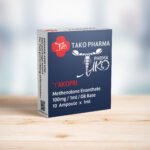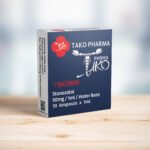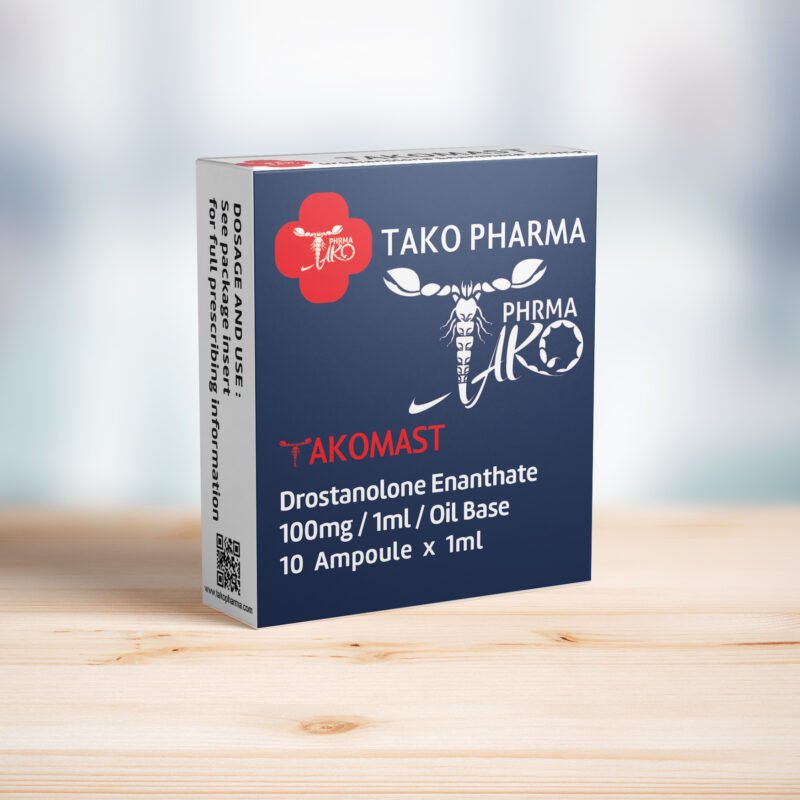
Methenolone Enanthate
June 29, 2024
Stanozolol 50mg
June 29, 2024Nandrolone Decanoate
“`html
Introduction to Nandrolone Decanoate
Nandrolone Decanoate, commonly known under the trade name Deca-Durabolin, is a synthetic anabolic steroid that has garnered significant attention in both medical and athletic circles. Originally synthesized in the 1960s, Nandrolone Decanoate is a derivative of the naturally occurring hormone testosterone. Its chemical composition features a decanoate ester attached to the nandrolone molecule, facilitating a slow release and extended half-life when administered via injection.
Classified as an anabolic-androgenic steroid (AAS), Nandrolone Decanoate exhibits properties that promote muscle growth and enhance physical performance. In medical contexts, it is utilized primarily for its anabolic benefits, such as stimulating muscle mass and bone density in patients suffering from chronic illnesses, osteoporosis, and severe trauma. The steroid’s ability to increase hemoglobin and red blood cell count also makes it beneficial in treating certain types of anemia.
Beyond its medical applications, Nandrolone Decanoate is frequently used in non-medical contexts, particularly within bodybuilding and athletic communities. Athletes and bodybuilders often seek out this steroid for its pronounced effects on muscle growth, recovery, and overall physical enhancement. Its relatively mild androgenic properties compared to other steroids make it a preferred choice for individuals looking to avoid significant androgenic side effects.
Despite its benefits, the use of Nandrolone Decanoate is not without risks. Understanding its origin, chemical structure, and primary uses provides a foundational knowledge for comprehending the broader implications of its application, both in medicine and beyond. As we delve deeper into its benefits and potential hazards, a comprehensive view of Nandrolone Decanoate’s role in various contexts will emerge.
Medical Uses and Benefits
Nandrolone Decanoate, commonly known in the medical community, is approved for several therapeutic applications, particularly in treating conditions like anemia, osteoporosis, and muscle wasting diseases. Its efficacy in these areas is well-documented, supported by extensive scientific research and clinical trials.
In the treatment of anemia, Nandrolone Decanoate plays a crucial role by stimulating erythropoiesis, the process of red blood cell production. Clinical studies have shown that this compound can significantly increase hemoglobin levels and red blood cell count, making it a valuable option for patients with chronic anemia, particularly those who do not respond well to other treatments. This ability to enhance red blood cell production helps improve oxygen transport throughout the body, alleviating symptoms of fatigue and weakness commonly associated with anemia.
For osteoporosis, Nandrolone Decanoate has been found to be effective in increasing bone density. It works by promoting the retention of calcium in the bones and stimulating bone matrix formation. Research indicates that patients receiving Nandrolone Decanoate exhibit marked improvements in bone mineral density, reducing the risk of fractures. This is particularly beneficial for postmenopausal women and elderly individuals, who are at higher risk of osteoporosis-related fractures.
Moreover, Nandrolone Decanoate is widely used in managing muscle wasting diseases, such as cachexia associated with chronic illnesses like cancer and HIV/AIDS. Its anabolic properties help in preserving lean body mass and enhancing muscle strength. By promoting protein synthesis and nitrogen retention, Nandrolone Decanoate helps mitigate muscle degradation and supports overall physical function. Studies have demonstrated that patients undergoing treatment with this compound experience significant improvements in muscle mass and physical performance.
The mechanism by which Nandrolone Decanoate operates involves binding to androgen receptors in various tissues, leading to an increase in protein synthesis and a decrease in protein breakdown. This dual action not only aids in muscle growth and repair but also supports the overall metabolic functions necessary for maintaining health in patients with debilitating conditions.
Use in Bodybuilding and Athletics
Nandrolone Decanoate has carved a significant niche in the realm of bodybuilding and athletics. Its popularity stems from its potent anabolic properties, which facilitate substantial muscle growth and strength enhancement. Athletes and bodybuilders often turn to Nandrolone Decanoate to achieve their performance objectives, leveraging its ability to promote protein synthesis and nitrogen retention, essential components for muscle development and recovery.
One of the primary reasons Nandrolone Decanoate is favored over other anabolic steroids is its relatively mild androgenic profile. This characteristic minimizes the risk of androgenic side effects such as hair loss and acne, making it a more attractive option for many users. Furthermore, its extended half-life allows for less frequent dosing, which is particularly beneficial for those seeking a more convenient administration schedule.
Studies have demonstrated that Nandrolone Decanoate can significantly enhance muscle mass and strength. For instance, a clinical trial involving resistance-trained athletes indicated a marked increase in lean body mass and muscle strength following a regimen of Nandrolone Decanoate. These findings highlight its efficacy and underscore why it remains a staple in many athletic training programs.
In addition to muscle growth, Nandrolone Decanoate is renowned for its ability to expedite recovery. The compound’s anti-inflammatory properties help reduce joint pain and muscle soreness, enabling athletes to maintain a consistent and intensive training schedule. This aspect is particularly advantageous for those involved in high-impact sports, where recovery is as crucial as performance.
Despite its benefits, it is imperative to acknowledge the potential risks associated with Nandrolone Decanoate use. While it offers advantages over other anabolic steroids, the risk of adverse effects such as cardiovascular issues and hormonal imbalances cannot be disregarded. As with any performance-enhancing substance, judicious use under medical supervision is essential to mitigate these risks and ensure the well-being of the user.
Dosage and Administration
Nandrolone Decanoate, commonly known by its brand name Deca-Durabolin, is a widely used anabolic steroid that requires careful administration to ensure both efficacy and safety. The recommended dosage of Nandrolone Decanoate varies significantly depending on its intended use, whether for medical treatment or performance enhancement.
For medical purposes, Nandrolone Decanoate is typically prescribed to treat conditions such as anemia and osteoporosis. In these cases, the dosage generally ranges from 50 to 100 milligrams per week for adults. This relatively low dosage is effective in addressing the underlying medical conditions while minimizing potential side effects.
In the realm of performance enhancement, athletes and bodybuilders often administer Nandrolone Decanoate to increase muscle mass and strength. The dosages in such scenarios are substantially higher, commonly ranging from 200 to 600 milligrams per week. It is crucial to note that higher dosages increase the risk of adverse effects, making it imperative to adhere strictly to recommended guidelines and cycle durations, typically lasting 8 to 12 weeks.
Nandrolone Decanoate is administered via intramuscular injection, typically into large muscle groups such as the gluteus maximus or the thigh. Proper administration techniques are essential to ensure the drug’s effectiveness and reduce the risk of complications such as infection or tissue damage. Consulting a healthcare professional for guidance on proper injection techniques is strongly advised.
Adhering to prescribed dosages is critical in minimizing the risks associated with Nandrolone Decanoate. Overuse or misuse can lead to severe side effects, including cardiovascular issues, liver damage, and hormonal imbalances. Regular monitoring by a healthcare provider is recommended to ensure safe and effective use of this potent anabolic steroid.
Potential Side Effects and Risks
Nandrolone Decanoate, while offering various therapeutic benefits, is not without its potential side effects and health risks. The use of this anabolic steroid can lead to both short-term and long-term adverse effects that necessitate careful consideration and medical supervision.
One of the primary concerns associated with Nandrolone Decanoate is its impact on cardiovascular health. Users may experience elevated blood pressure and alterations in cholesterol levels, such as an increase in low-density lipoprotein (LDL) and a decrease in high-density lipoprotein (HDL). These changes can contribute to an increased risk of atherosclerosis and other cardiovascular diseases.
Hormonal imbalances are another significant risk. Nandrolone Decanoate can disrupt the body’s natural hormone production, leading to conditions such as gynecomastia (enlargement of male breast tissue), testicular atrophy, and infertility. These effects result from the suppression of endogenous testosterone production and the subsequent imbalance between anabolic and androgenic hormones.
Liver damage is also a potential risk, although it is more commonly associated with oral anabolic steroids. However, injectable forms like Nandrolone Decanoate can still contribute to hepatic strain, particularly with prolonged use. Users might experience elevated liver enzymes, which can indicate liver stress or damage over time.
Additional side effects include psychological changes such as mood swings, aggression, and depression. These can be particularly troubling as they impact not only the user but also those around them. Furthermore, there is the risk of androgenic side effects such as acne, hair loss, and increased body hair growth, which can be distressing for some individuals.
Given the severity of these potential risks, it is crucial for users to undergo regular medical monitoring. Healthcare professionals can offer guidance on dosage, duration of use, and necessary precautions to mitigate adverse effects. In conclusion, while Nandrolone Decanoate can provide therapeutic benefits, the potential side effects and health risks underscore the importance of cautious and informed use.
Legal Status and Regulatory Issues
Nandrolone Decanoate, a potent anabolic steroid, is subject to strict regulatory controls in many countries due to its potential for misuse and health risks. In the United States, it is classified as a Schedule III controlled substance under the Controlled Substances Act, making it illegal to possess or distribute without a valid prescription. Similarly, in Canada, it is listed under Schedule IV of the Controlled Drugs and Substances Act, and its use is tightly regulated.
In the European Union, the legal status of Nandrolone Decanoate varies by country. For instance, in the United Kingdom, it is classified as a Class C drug under the Misuse of Drugs Act 1971, and unauthorized possession or distribution can lead to severe legal penalties. Germany has adopted the Anti-Doping Act, which imposes stringent regulations on the use of anabolic steroids, including Nandrolone Decanoate. The possession and distribution of these substances without medical justification can result in significant fines and imprisonment.
Australia also maintains strict control over Nandrolone Decanoate, categorizing it as a Schedule 4 prescription-only medicine. Unauthorized possession or distribution can lead to legal action, underscoring the country’s commitment to regulating its use. In contrast, certain countries in Asia and South America have more lenient regulations, though international pressure and the global anti-doping movement are prompting stricter controls.
Several high-profile legal cases have spotlighted the misuse of Nandrolone Decanoate, particularly in the sports world. Athletes found to be using this substance without medical justification have faced suspensions, fines, and tarnished reputations. These cases highlight the broader implications for users, emphasizing the importance of adhering to legal and medical guidelines.
The regulatory landscape for Nandrolone Decanoate illustrates the balance that governments seek to achieve—curbing misuse while allowing legitimate medical applications. Users, whether medical or recreational, must navigate these regulations carefully to avoid legal repercussions and ensure safe usage.
Alternatives and Comparisons
When considering alternatives to Nandrolone Decanoate, it is crucial to evaluate both anabolic steroids and non-steroidal options. Among anabolic steroids, testosterone enanthate, stanozolol, and oxandrolone are frequently cited substitutes. Testosterone enanthate, for instance, is known for its powerful anabolic effects, comparable to those of Nandrolone Decanoate. However, it often comes with a higher risk of androgenic side effects, such as hair loss and acne.
Stanozolol, another anabolic steroid, is preferred for its ability to enhance muscle strength without significant weight gain. This makes it a favorable option for athletes requiring strength and agility. On the downside, stanozolol can be harsh on the liver and may also lead to joint pain due to its drying effects on the joints. Similarly, oxandrolone is considered a milder steroid with fewer side effects, making it suitable for both men and women. Its anabolic effects, however, are less potent compared to Nandrolone Decanoate, often necessitating longer cycles to achieve desired outcomes.
In terms of non-steroidal alternatives, selective androgen receptor modulators (SARMs) such as Ostarine and Ligandrol have gained popularity. These compounds offer anabolic benefits with fewer androgenic side effects, providing a safer profile for those wary of steroid-related risks. However, the long-term safety of SARMs is still under investigation, and their use should be approached with caution.
Another non-steroidal option is natural supplements like creatine and branched-chain amino acids (BCAAs). While these do not offer the same anabolic effects as Nandrolone Decanoate, they can still support muscle growth and recovery. Creatine, for instance, enhances muscle energy stores, improving performance and strength. BCAAs, on the other hand, aid in muscle protein synthesis and reduce muscle soreness.
Ultimately, the choice between Nandrolone Decanoate and its alternatives hinges on individual goals, risk tolerance, and the need for medical supervision. Consulting with a healthcare professional to tailor a suitable regimen is always recommended to ensure both efficacy and safety.
Conclusion and Final Thoughts
Nandrolone Decanoate, an anabolic steroid, has been extensively used for various medical and non-medical purposes due to its potential benefits. Throughout this blog post, we have explored its uses, which include the treatment of chronic illnesses, muscle wasting diseases, and osteoporosis. Additionally, its role in enhancing athletic performance has been acknowledged, albeit controversial.
The benefits of Nandrolone Decanoate are notable. These include increased muscle mass, improved bone density, and alleviation of joint pain. Such effects make it a valuable tool for patients suffering from debilitating conditions. However, these benefits come with significant risks that cannot be ignored. Potential side effects range from cardiovascular issues, liver damage, and hormonal imbalances to psychological effects such as aggression and depression.
Given these risks, the importance of medical supervision when using Nandrolone Decanoate cannot be overstated. Responsible use under the guidance of a healthcare professional is crucial to mitigate adverse effects and optimize therapeutic outcomes. Additionally, it is vital for individuals considering its use to conduct thorough research and consult healthcare providers to make informed decisions.
In summary, while Nandrolone Decanoate offers significant benefits, its potential risks necessitate careful consideration and responsible use. The decision to use this steroid should be made with a full understanding of its implications, and always in consultation with a qualified healthcare professional. This ensures that the benefits can be harnessed safely while minimizing the potential for harm.
As with any medical treatment or enhancement strategy, staying informed and seeking professional advice are the best steps to ensure safety and efficacy. We encourage readers to delve deeper into the subject and engage with healthcare experts to make educated choices about Nandrolone Decanoate.





Reviews
There are no reviews yet.